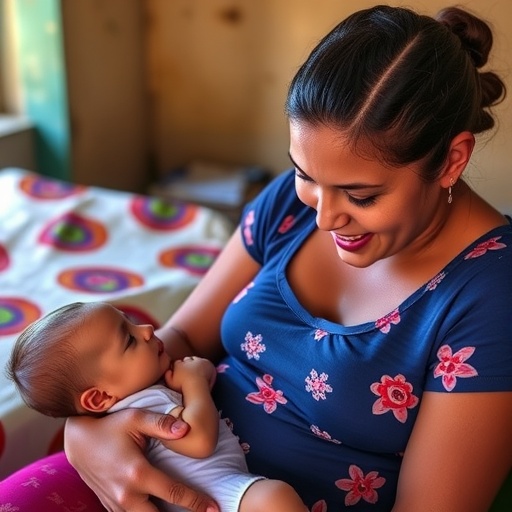Unconditional Cash Transfers Show Promise for Enhancing Postpartum Health Outcomes in the U.S.
The United States is grappling with a burgeoning maternal health crisis, marked by maternal mortality rates surpassing those of any other high-income nation. This stark reality underscores the complex interplay of social determinants, including income disparities, which profoundly influence maternal morbidity and mortality. Recent research efforts have honed in on one promising avenue to mitigate postpartum challenges: unconditional cash transfers (UCTs) to low-income parents. A newly published systematic review in the Annals of Internal Medicine sheds light on how these direct financial interventions potentially shape postpartum health outcomes across diverse U.S. populations.
Postpartum mortality—defined as deaths occurring during pregnancy or within one year after delivery—accounts for a considerable proportion of maternal deaths. The postpartum phase, spanning from childbirth up to two years later, remains critical yet under-researched. Recognizing this gap, researchers embarked on an unprecedented review to evaluate the impact of UCTs on postpartum health metrics, focusing on the U.S. context where socioeconomic inequities are starkly linked to health disparities.
Unconditional cash transfers, in this review, encompassed a spectrum of financial support mechanisms ranging from government-administered social programs like tax credits and Social Security disability benefits to experimental models deploying direct cash payments to new mothers. This comprehensive approach allowed researchers to assess varied methods by which financial resources reach postpartum individuals, providing nuanced insights into their efficacy.
The review process involved a rigorous search for eligible studies, culminating in the analysis of 11 reports derived from six distinct investigations. Of these, four studies provided evaluations of existing social safety net programs, whereas two consisted of controlled experiments that disbursed funds directly to low-income postpartum individuals. The methodological robustness was underscored by a dual data extraction strategy and meticulous assessments of study quality and evidence strength.
A salient finding from this research synthesis is the consistent association between UCTs and increased breastfeeding rates. This correlation appeared across varied socioeconomic and demographic settings, suggesting a potentially universal benefit of financial support in promoting breastfeeding behaviors. Scientifically, breastfeeding is known to confer extensive health advantages for mothers, including reduced risks of hypertension, diabetes mellitus, and certain hormone-related cancers such as breast and ovarian cancer.
The mechanistic pathways through which UCTs bolster breastfeeding remain to be fully elucidated. Financial support may alleviate economic stressors, enabling mothers to dedicate more time and resources to breastfeeding rather than juggling competing economic demands. Additionally, the alleviation of financial burden might facilitate better access to breastfeeding support services, healthy nutrition, or childcare arrangements, all of which can synergistically improve breastfeeding outcomes.
Intriguingly, while breastfeeding benefits were prominent, the review found little to no significant impact of UCTs on postpartum mood, particularly depressive symptoms. This finding is crucial, as postpartum depression affects a substantial proportion of new mothers and carries implications for both maternal and infant well-being. Some contributors to the original studies hypothesized that the scale of financial interventions might have been insufficient in magnitude or duration to manifest measurable improvements in mental health outcomes.
The nuanced relationship between financial support and mental health underscores the complexity of postpartum depression, which is influenced by a multifactorial interplay of biological, psychological, and social elements. It raises critical questions about the ideal design, size, and timeline of cash transfer programs to meaningfully address maternal mental health.
A compelling aspect highlighted by this review is the paucity of data captured on postpartum outcomes beyond breastfeeding and mood disorders in the context of UCTs. Outcomes related to delivery complications, cardiovascular health, and broader mental health parameters remain insufficiently studied. Given the elevated risks of heart disease and other comorbidities in postpartum mothers, future research agendas must prioritize a broader spectrum of health indicators.
The researchers call for stronger interdisciplinary collaborations, particularly between social scientists and clinicians, to craft and evaluate future interventions. Such partnerships are vital to comprehensively map the socioeconomic determinants of postpartum health and to design targeted policies that can translate into tangible health benefits.
From a health policy perspective, these findings emphasize the potential of UCTs as a cost-effective strategy. By supporting new parents financially, such programs could reduce hospital readmissions and enhance child developmental outcomes, thereby generating savings for public health systems over time.
This systematic review marks a significant step toward integrating social determinants into postnatal care paradigms. As the U.S. continues to confront its maternal health emergency, innovative approaches like UCTs could play a pivotal role in fostering equitable and resilient health environments for families.
Publication in a high-impact journal like the Annals of Internal Medicine ensures that these insights reach policymakers, researchers, and healthcare providers alike, potentially shaping future interventions and informing clinical practice guidelines.
Given the urgency of the maternal health crisis, the research community anticipates subsequent studies that deepen understanding of how financial assistance interacts with other support systems to optimize postpartum outcomes.
In sum, unconditional cash transfers emerge as a promising, though not singular, tool in the broader strategy to improve postpartum health in the United States. Their evident benefit in enhancing breastfeeding rates holds promise for long-term maternal and child health, while the complex relationship with mental health warrants further investigation. This research invites a paradigm shift—recognizing that financial security is intrinsically linked to biological health and wellbeing during one of life’s most vulnerable periods.
Subject of Research: Not applicable
Article Title: Associations Between Unconditional Cash Transfers and Postpartum Outcomes in the United States: A Systematic Review
News Publication Date: 27-May-2025
Web References: 10.7326/ANNALS-24-03495
Keywords: Health and medicine, Clinical medicine




